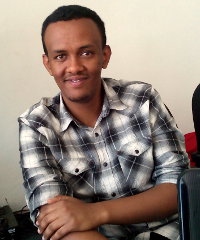Start-up snapshot: Co-founder of Ethiopia’s Addiscan discusses his business
Start-up: Addiscan
Temesgen Feseha is co-founder of Addiscan, an Ethiopian-based start-up which offers warehouse management and round the clock cargo tracking. Addiscan seeks to solve the challenges faced by companies which operate multiple warehouses and engage in transportation of goods. Its service enables such companies to monitor the whereabouts of their goods while in storage, and in transit.
1. Give us your elevator pitch.
Addiscan provides businesses with a centralised platform to manage their different resources. Our goal is to enable the managers to make data-based decisions for their businesses. For example, a company could have multiple warehouses in different cities around the world. They can easily keep track of what’s happening at any one of them using our fleet and warehouse management systems. They will know when goods are stationary and when they are being moved by using GPS trackers, security cameras, electronic padlocks that have notification capabilities, and other hardware integrated into our system. They can get notifications on the exact locations of their assets and progress via a mobile app, SMS or email, depending on their preference.
2. How did you finance your start-up?
We have been bootstrapping it. Initially we needed about US$4,900 to purchase the hardware. We raised that from our personal savings and from family and friends. We have not received any external funding.
3. If you were given US$1m to invest in your company now, where would it go?
That kind of money would be useful when we reach a point where we have 100 clients or more. But at the moment we don’t need that amount of money.
4. What risks does your business face?
There is always the risk of competition. However we are not afraid because our product is different and we have certain design principles we’ve included. We know our clients are different and have different needs, so our system needs to be flexible.
So for example, one customer might want their different cars being tracked but not their warehouses and to get their notifications through email or SMS or mobile app. We could do any of those because we built the system as a very modular and very flexible product and service. So we are able to move flexibly and provide our services to anyone who wants it.
5. So far, what has proven to be the most successful form of marketing?
Our best strategy has been to approach businesses and demonstrate our product. We find that more effective compared with placing adverts on TV or radio. We need to go to companies in person, show them the capabilities of our product, and convince them to sign up.
6. What has been your biggest mistake, and what have you learnt from it?
We should have made initial studies of our market to know exactly how many businesses could use our products. We didn’t look for official statistics, and I think that was a mistake we need to correct soon. We need to know exactly how many companies want our product and have resources such as warehouses. We know there are many of them, but not exactly how many, and what kind of industries they are operating in. This kind of information will enable us provide more specific market-based solutions.
Additionally, because most of us are engineers and we love to code, we focused too much on our product. We made the mistake of not giving enough attention to the marketing and sales sides of the business. Our team’s orientation is a bit too technical. So moving forward we will need people who take the time to solely focus on the sales and marketing areas.


